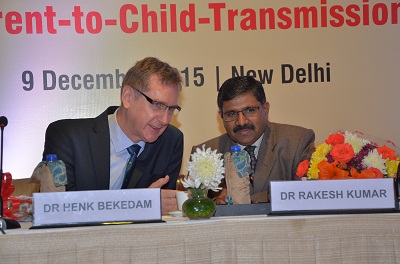
The Ministry of Health & Family Welfare, Government of India and the World Health Organization (WHO) Country Office for India organized a day-long meeting to discuss strategies to eliminate mother-to-child transmission of HIV and syphilis using antiretroviral treatment on 9 December 2015.
India has more than 2.1 million people living with HIV. The 2015 HIV estimates show that 35 000 pregnant women are infected with HIV annually and there are about 10 000 new HIV infections every year among children.
Highlighting the critical importance of the issue, Dr Rakesh Kumar, Joint Secretary (RCH), MoHFW, Government of India, stressed on the importance of integration and urged the participants to come up with a prescriptive plan that can be implemented.
“What can be done, should be done,” he added.
In 2011, WHO launched the all-important initiative for the dual elimination of mother-to-child transmission of HIV (E-MTCT) and syphilis. It strives to reduce childhood mortality, improve maternal health and combat HIV/AIDS and syphilis.
Speaking on the occasion, Dr Henk Bekedam, WHO Representative for India, urged that in order to eliminate parent to child transmission (PTCT), it is important that all pregnant women in India are tested for HIV and syphilis.
“Integration of Reproductive Maternal Newborn Child Health & Adolescent Programme (RMNCH+A) can act as a catalytic move towards elimination of Parent-to-Child-Transmission of HIV and achieving the larger goal of moving towards ending AIDS in India,” he said.
At the inaugural session, keynote speakers shared an overview of the Prevention of Parent-to-Child-Transmission (PPTCT) Programme of HIV and syphilis in India and discussed the Action Plan for scale-up of PPTCT Services of HIV and syphilis in the country.
During the workshop, the participants deliberated on the key topics of: reaching out to adolescents for preventing primary infection of HIV and syphilis; consolidating efforts in prevention of unwanted pregnancies in HIV/syphilis positive couples/discordant couples; scaling-up interventions for E-PTCT of HIV and syphilis through integration with RMNCH+A and private sector, and harmonizing existing reporting systems for E-PTCT of HIV and syphilis.
Around 100 technical experts, both national and international, attended the meeting. Representatives of the Ministry of Health & Family Welfare, development partners along with key WHO officials were a part of the deliberations.
